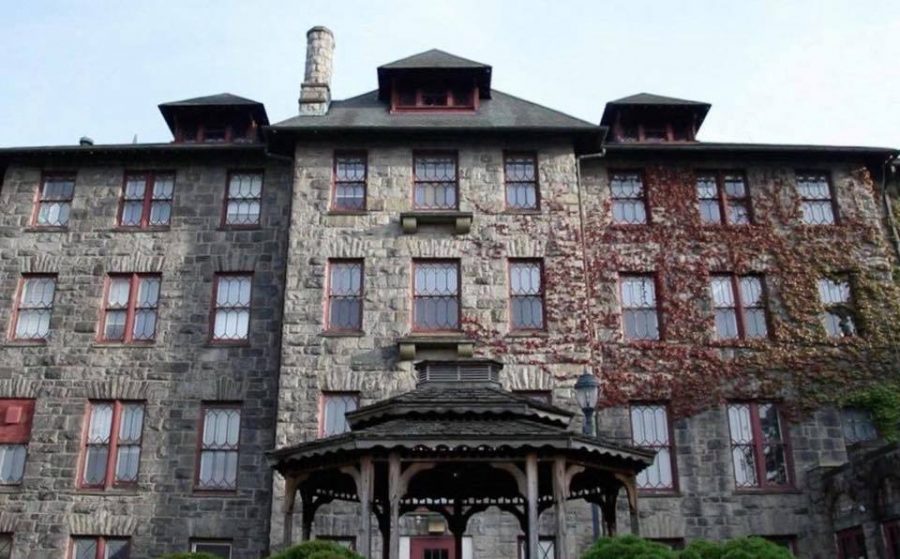Marywood president signs “option and purchase” agreement for South Campus
Photo credit/ Manfid Duran
January 24, 2018
Marywood’s South Campus property may have a buyer.
Marywood President Sr. Mary Persico, IHM, Ed.D signed an “option and purchase” agreement for South Campus with the company Urban Smart Growth on Jan. 3.
Persico announced the news during a campus meeting of faculty, staff and administrators yesterday afternoon.
The university purchased the former Scranton State School for the Deaf property on 1800 N. Washington Ave. in 2011 for $500,000. After original plans to renovate the buildings and relocate some programs were not carried out, the administration placed the property on the market in 2015.
Persico said during that time period, 90 individuals and organizations combined have toured the property. Some gave offers that were not in a favorable price range to the university while others were vague about their plans for the property.
Urban Smart Growth is a Los Angeles-based company founded in 2004 with the motto “returning energy to our urban cores.”
The company revitalizes old and historic structures across the country for both commercial and residential use, according to the company’s website. So far, the company has worked on 54 properties in six states.
Sr. Jane Snyder, IHM, assistant director of retention management and financial advisement, said Urban Smart Growth’s experience is a positive aspect of the deal.
“I think the fact that they’ve done it before is a good thing,” Snyder said. “I have to imagine that our people have done the work that they need to do to look at this company seriously and say this can work for us.”
The company will have 13 months to do their “due diligence” and decide if they definitely want to purchase the property, according to Persico.
On Feb. 4, the company will meet with representatives of the Scranton community to share its plans. The company has also asked Marywood to help organize a meeting with neighbors around the South Campus area.
At yesterday’s campus meeting, Persico discussed Urban Smart Growth’s plans for the South Campus property.
The company will be seeking federal and state tax credits to preserve the nine buildings that make up South Campus.
Under these plans, six of the buildings will be converted into apartments. Persico said the apartments will be intergenerational and open to families, couples and individuals. The apartments will not all be the same and range from studios to luxury.
She said the company will not specifically advertise the housing to students, but students are not restricted from living there.
Urban Smart Growth will also assess how much space for parking is necessary and expand areas within the property to minimize disturbance to the neighborhood.
Plans also include a quad that can serve as a sitting area and venue for events.
In another building, the company plans to open an experimental bed and breakfast for people visiting the area and small, private events on the first floor. If it does not work out, it will be transformed into more apartments, Persico said. The second floor will have apartments.
The remaining two buildings, which Persico described as the most “flexible and modern,” would be open to the public. The company wants to include a restaurant on the first floor with open air spaces for events like art galleries on the second floor.
Under Urban Smart Growth’s plans, the other building would be a neighborhood-based community center for the greater Green Ridge area with a swimming pool, gym and stage for performances or events. A plaza between these two buildings would be used for events like farmer’s markets and art exhibits.
Persico also said the company plans to widen and beautify the overgrown trails on the property and set up recreational equipment like swings.
According to Persico, the company wants to hire local people to work on the property rather than bring in outsiders to run operations.
Vice President for Business Affairs Tammy McHale said she believes these plans could provide opportunities for Marywood students.
“They’ve already hired one of our architecture students and they’re interested in collaborating with us,” McHale said. “I think they’ll hire some of our students to work with them, so I think it’ll provide some other opportunities for them.”
McHale also said she hopes the community near South Campus reacts positively.
“I think when they see how it will benefit, it’s much better than having vacant buildings,” she said. “That’s just an eyesore over time, so having sort of a vibrancy to the neighborhood I think will be nice.”
Persico said she believes the plans outlined by Urban Smart Growth would be beneficial to the Marywood community.
“I think that we’re going to be able to work together with the company that buys Marywood South [Campus] to do things that are going to benefit Marywood’s programs, especially in the areas of art, recreation, dietetics and nutrition, architecture and others,” she said.
Justin Kucharski contributed to this article.
Contact the writer:[email protected]
Twitter: @BWilliamsTWW





